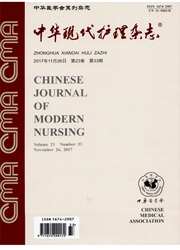

 中文摘要:
中文摘要:
目的探讨耳穴压豆联合穴位帖敷对治疗腹腔镜胆囊切除患者术后胃肠功能紊乱及焦虑抑郁情绪的影响,为中医护理技术在临床护理实践中的推广提供科学依据。方法根据随机数字序列表将纳入的100例择期行腹腔镜胆囊切除术的患者分为对照组和观察组。对照组采用常规护理,观察组在常规护理的基础上进行耳穴压豆联合穴位贴敷干预,比较两组术后首次排气、排便时间、腹痛程度、辅助用药及焦虑抑郁情况。结果观察组术后首次排气和排便时间分别为(22.12±2.57)h和(52.37±4.12)h,明显少于对照组的(32.61±3.66)h和(72.67±4.05)h,腹痛程度轻于对照组,辅助用药例数少于对照组,差异均有统计学意义(P〈0.05)。两组焦虑、抑郁得分均明显低于治疗前.观察组得分低于对照组,差异具有统计学意义(P〈0.05)。结论耳穴压豆联合穴位贴敷有促进术后胃肠功能紊乱及缓解患者焦虑情绪的效果,此中医护理方案可在临床护理实践中推广。
 英文摘要:
英文摘要:
Objective To evaluate the treatment effect of auricular pressure combined with acupoint sticking for gastrointestinal dysfunction after laparoscopic cholecystectomy (LC), and provide scientific references for the promotion of traditional Chinese medicine (TCM) nursing in clinical nursing practice. Methods Totally 100 patients with LC were randomly divided into the observation group and the control group. Patients in the Observation group received auricular pressure combined with acupoint sticking based on the routine nursing method, while patients in the control group received the routine nursing method. The time for the first postoperative aerofluxus and defecation, degree of abdominal pain, the usage of auxiliary medicine, the situation of anxiety and depression were observed and compared between two groups. Results The time for the first postoperative aerofluxus and defecation were (22.12±2.57) h and (52.37±4.12) h in the observation group, which were significantly shorter than the time of the control group [ ( 32.61 ± 3.66), ( 72.67 ± 4.05 ) h; the degree of abdominal pain in the observation group was significantly lower than that in the control group; the ratio of auxiliary medicine in the control group was more than that in the observation group (P〈0.05). The score of anxiety and depression in two groups was obvious lower than that before treatment, and the score in the observation group was significantly lower than that in the control group (P 〈 0. 05). Conclusions Auricular pressure combined with acupoint sticking can promote postoperative gastrointestinal dysfunction and relieve patients anxiety, so this therapy can be popularized in clinical nursing practice.
 同期刊论文项目
同期刊论文项目
 同项目期刊论文
同项目期刊论文
 期刊信息
期刊信息
